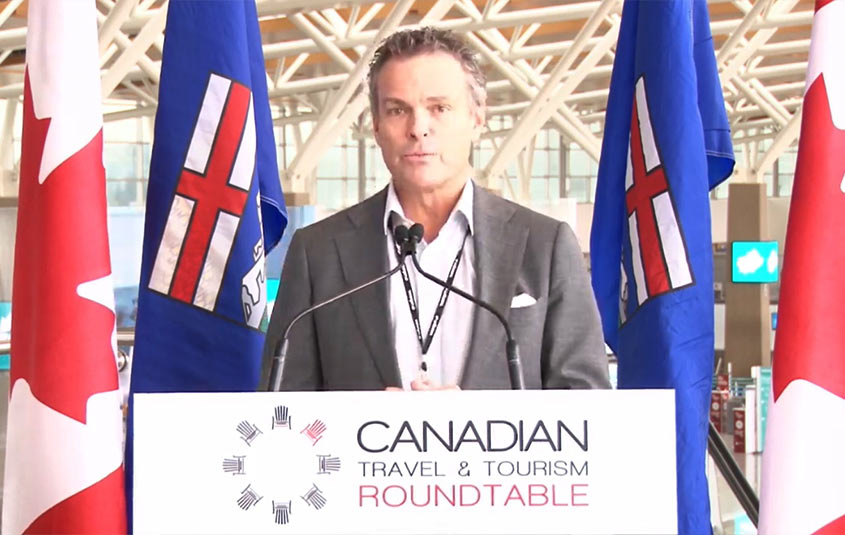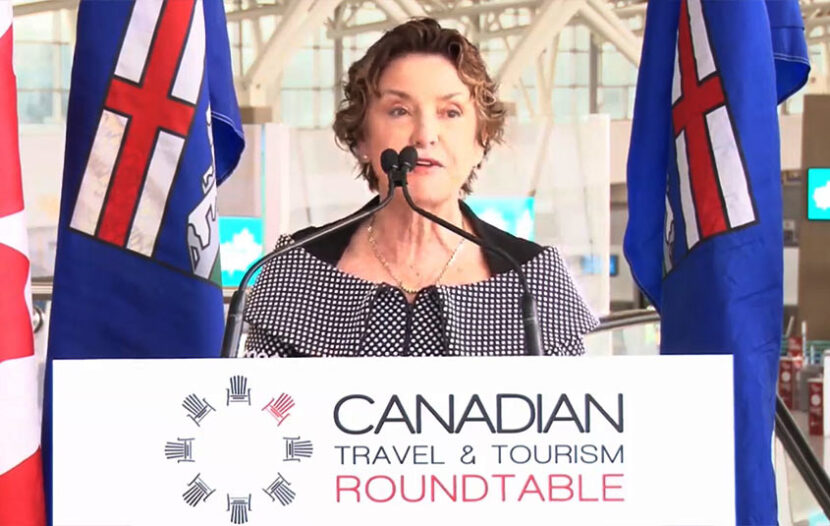CALGARY — The Canadian Travel & Tourism Roundtable has a key message for the federal government: stop making travel a scapegoat at this stage in the COVID-19 pandemic.
WestJet’s Richard Bartrem, VP Marketing Communications, addressed the issue head-on at yesterday’s Roundtable’s briefing, which took place at Calgary Airport. “This sector continues to be the only sector subject to testing,” said Bartrem.
The point was also driven home by Lesley Keyter, CEO and founder of Calgary-based The Travel Lady Agency. At yesterday’s briefing, Keyter highlighted the severe impact on travel agencies resulting from the pandemic and the restrictions on travel.
The eased travel measures in effect since Feb. 28, including the option of antigen testing to meet the pre-arrival requirement, don’t go far enough, says Keyter.
“As we enter this new phase of the pandemic, one characterized by mass vaccination and low counts, I would have assumed that pre-entry requirements would have been completely lifted, as they haven many other countries. They have not,” said Keyter.
Keyter added: “At the beginning of the pandemic, testing requirements made sense, the science was clear. Today, the reason is less clear.”

WestJet’s Richard Bartrem, VP Marketing Communications
And the fear of testing positive in-destination and not being able to return home “is just too much for some Canadians,” she said, adding that foreign visitors looking to vacation in Canada have the same concerns, causing concern for Canada’s inbound tourism industry that has also suffered these past two years.
EXTENSION FOR FINANCIAL AID DESPERATELY NEEDED
Keyter’s call to the federal government was two-fold.
First, remove the remaining pre-entry testing requirement for all vaccinated travellers coming into Canada, whether they are returning Canadians or visitors.
And second, says Keyter, “continue the current federal support program for the travel and tourism industry beyond March.”
Keyter underscored the immense challenges the retail travel industry has faced since the start of the pandemic.
“Since March 2020 travel agents have worked tirelessly to rescue stranded Canadians, to rebook and rebook again travel arrangements and requests, to deal with refunds and requests for refunds from customers. All of this without any compensation for the travel agent,” said Keyter.
“The very core of our business is sending Canadians traveller, so when the travel advisories came up our business stood still. It has not been easy,” she added.
“Fortunately, the government aid programs have helped many of us retain some of our staff, and cover some of our expenses. Unfortunately these programs are set to send soon. And this is of particular concern to travel agencies. Because unlike other businesses, we don’t get paid when we render the service. Only when the customer travels, which can take quite some time,” she noted.
Keyter urged the government to extend programs like the Tourism and Hospitality Recovery Program, which is set to start winding down and end completely in May. “There are many in this industry who will need this help when travel rebounds,” she said.

Dr. Zain Chagla, Medical Director, Infection Control at St. Joseph’s Healthcare
“DOESN’T GO FAR ENOUGH”
This latest Roundtable briefing also included a virtual appearance by Dr. Zain Chagla, Medical Director, Infection Control at St. Joseph’s Healthcare, who also spoke at the Roundtable’s Feb. 10, 2022 briefing, just before the federal government announced the new eased travel measures.
Dr. Chagla said yesterday that while he’s glad for the easing of the border measures, it doesn’t go far enough, “and again, this doesn’t follow our international counterparts. [And] the yield for this type of [on arrival randomized] testing is very, very low, for a significant cost and anxiety for the traveller.”
Later he added: “People are getting COVID in their local towns … why are we so fixated on the border as a point of entry for this virus?”

